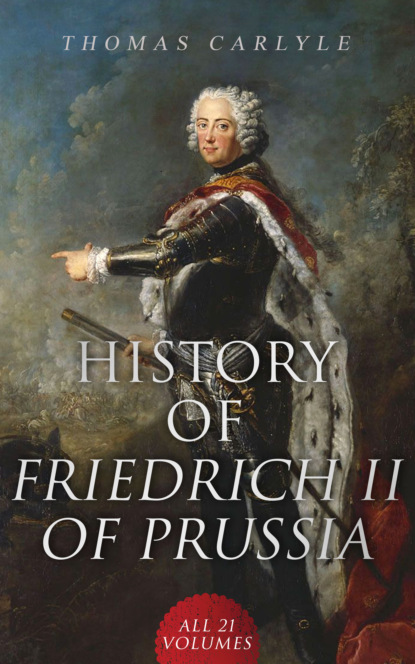present:
BAIREUTH.
(1.) CHRISTIAN, second son of Kurfurst Johann George: born 1581; got Baireuth 1603; died 1655. A distinguished Governor in his sphere. Had two sons; the elder died before him, but left a son, Christian Ernst; who (2.) succeeded, and (3.) whose son, George Wilhelm: 1644, 1655, 1712; 1678, 1712, 1726 (are BIRTH, ACCESSION, END of these two); the latter of whom had no son that lived. Upon which the posterity of Christian's second son succeeded. Second son of Christian notable to us in two little ways: FIRST, That HE, George Albert, Margraf of CULMbach, is the inscrutable "Marquis de LULENbach" of Bromley's Letters (antea p. 184, let the Commentators take comfort!); SECOND and better, That from him came our little Wilhelmina's Husband—as will be afterwards explained. It was his grandson (4.) that succeeded in Baireuth, George Friedrich Karl (1688, 1726, 1735); Father of Wilhelmina's Husband. After whom (5.) his Son Friedrich (1711, 1735, 1763), Wilhelmina's Husband; who leaving (1763) nothing hut a daughter, Baireuth fell to Anspach, 1769, after an old Uncle (6.), childless, had also died. SIX Baireuth Margraves of this Line; FIVE generations; and then to Anspach, in 1769.
ANSPACH.
(1.) JOACHIM ERNST, third son of Kurfurst Johann George: born 1583; got Anspach 1603; died 1625. Had military tendencies, experiences; did not thrive as Captain of the EVANGELICAL UNION (1619–1620) when WINTER-KING came up and THIRTY-YEARS WAR along with him. Left two sons; elder of whom, (2.) Friedrich, nominally Sovereign, age still only eighteen, fell in the Battle of Nordlingen (worst battle of the Thirty-Years War, 1634); and the younger of whom, (3.) Albert, succeeded (1620, 1634, 1667), and his son, (4.) Johann Friedrich (1654, 1667, 1686); and (5, 6, 7.) no fewer than three grandsons—children mostly, though entitled "sovereign"—in a PARALLEL way (Christian Albert, 1675, 1686, 1692; George Friedrich, 1678, 1692, 1703; Wilhelm Friedrich, 1685, 1703, 1723). Two little points notable here also, and no third:
FIRST, That one of the grand-DAUGHTERS, full-sister of the last of these three parallel figures, half-sister of the two former, was—Queen Caroline, George II.'s wife, who has still some fame with us.
SECOND, That the youngest of said three grandsons, Queen Caroline's full-brother, left a son then minor, who became major, (8.) and wedded a Sister of our dear little Wilhelmina's, of whom we shall hear (Karl Wilhelm Friedrich, 1712, 1723, 1757); unmomentous Margraf otherwise. His and her one son it was, (9.) Christian Friedrich Karl Alexander (1736, 1757, 1806), who inherited Baireuth, inherited Actress Clairon, Lady Craven, and at Hammersmith (House once Bubb Doddington's, if that has any charm) ended the affair.
NINE Anspach Margraves; in FIVE generations: end, 1806.
END OF BOOK III
Volume 04
BOOK IV. — FRIEDRICH'S APPRENTICESHIP, FIRST STAGE. - 1713-1728.
CHAPTER I. — CHILDHOOD: DOUBLE EDUCATIONAL ELEMENT.
FIRST EDUCATIONAL ELEMENT, THE FRENCH ONE.
Chapter II. — THE GERMAN ELEMENT.
OF THE DESSAUER, NOT YET "OLD."
Chapter III. — FRIEDRICH WILHELM IS KING.
Chapter IV. — HIS MAJESTY'S WAYS.
Chapter V. — FRIEDRICH WILHELM'S ONE WAR.
THE DEVIL IN HARNESS: CREUTZ THE FINANCE-MINISTER.
Chapter VI. — THE LITTLE DRUMMER.
Chapter VII. — TRANSIT OF CZAR PETER.
Chapter VIII. — THE CROWN-PRINCE IS PUT TO HIS SCHOOLING.
Chapter X. — THE HEIDELBERG PROTESTANTS.
OF KUR-PFALZ KARL PHILIP: HOW HE GOT A WIFE LONG SINCE, AND DID FEATS IN THE WORLD.
KARL PHILIP AND HIS HEIDELBERG PROTESTANTS.
FRIEDRICH WILHELM'S METHOD;—PROVES REMEDIAL IN HEIDELBERG.
PRUSSIAN MAJESTY HAS DISPLEASED THE KAISER AND THE KING OF POLAND.
Chapter XI. — ON THE CROWN-PRINCE'S PROGRESS IN HIS SCHOOLING.
THE NOLTENIUS-AND-PANZENDORF DRILL-EXERCISE.
Chapter XII. — CROWN-PRINCE FALLS INTO DISFAVOR WITH PAPA.
Chapter XIII. — RESULTS OF THE CROWN-PRINCE'S SCHOOLING.
BOOK IV. — FRIEDRICH'S APPRENTICESHIP, FIRST STAGE. - 1713–1728.
CHAPTER I. — CHILDHOOD: DOUBLE EDUCATIONAL ELEMENT.
Of Friedrich's childhood, there is not, after all our reading, much that it would interest the English public to hear tell of. Perhaps not much of knowable that deserves anywhere to be known. Books on it, expressly handling it, and Books on Friedrich Wilhelm's Court and History, of which it is always a main element, are not wanting: but they are mainly of the sad sort which, with pain and difficulty, teach us nothing, Books done by pedants and tenebrific persons, under the name of men; dwelling not on things, but, at endless length, on the outer husks of things: of unparalleled confusion, too;—not so much as an Index granted you; to the poor half-peck of cinders, hidden in these wagon-loads of ashes, no sieve allowed! Books tending really to fill the mind with mere dust-whirlwinds—if the mind did not straightway blow them out again; which it does. Of these let us say nothing. Seldom had so curious a Phenomenon worse treatment from the Dryasdust, species.
Among these Books, touching on Friedrich's childhood, and treating of his Father's Court, there is hardly above one that we can characterize as fairly human: the Book written by his little Sister Wilhelmina, when she grew to size and knowledge of
